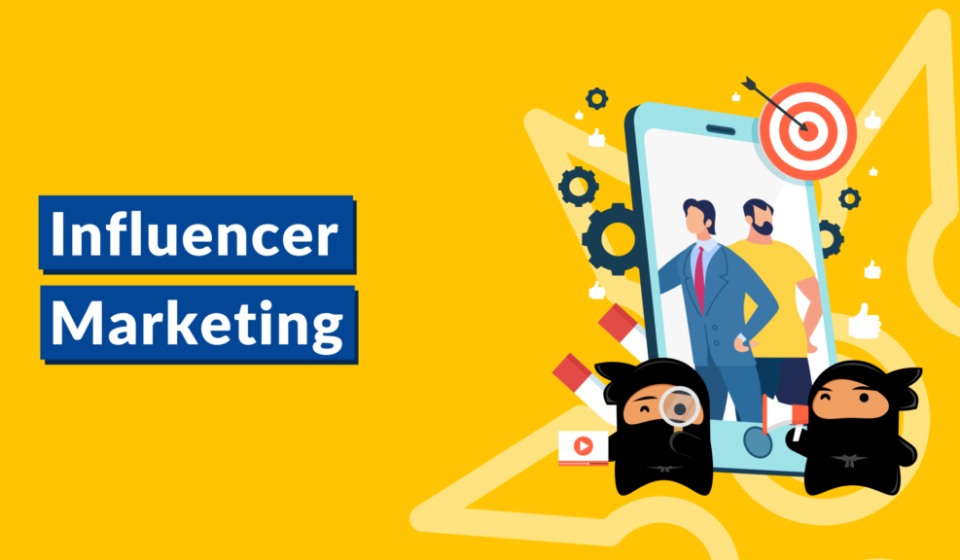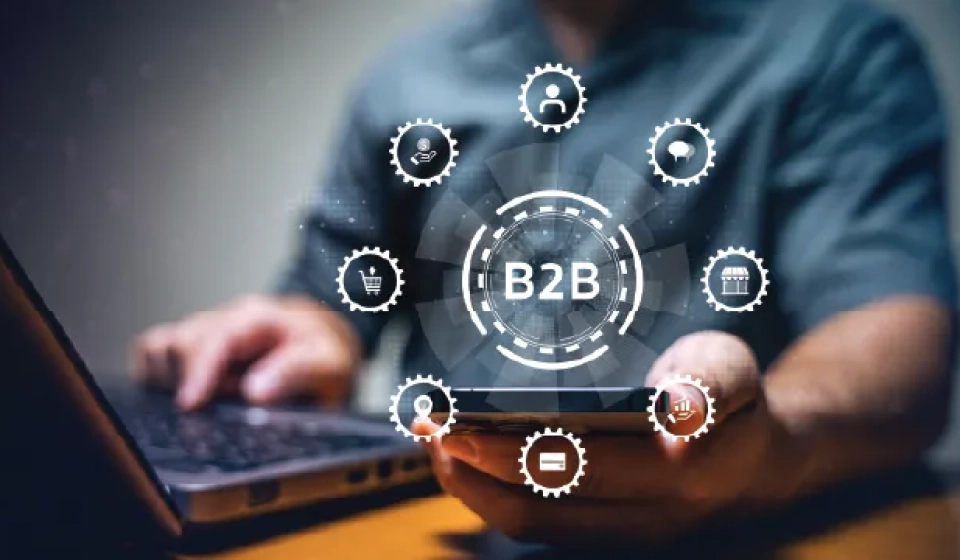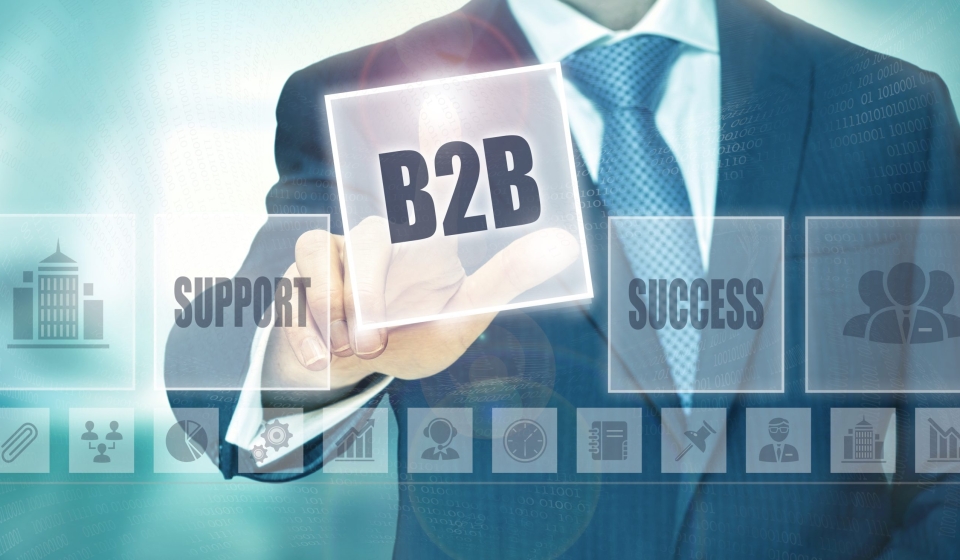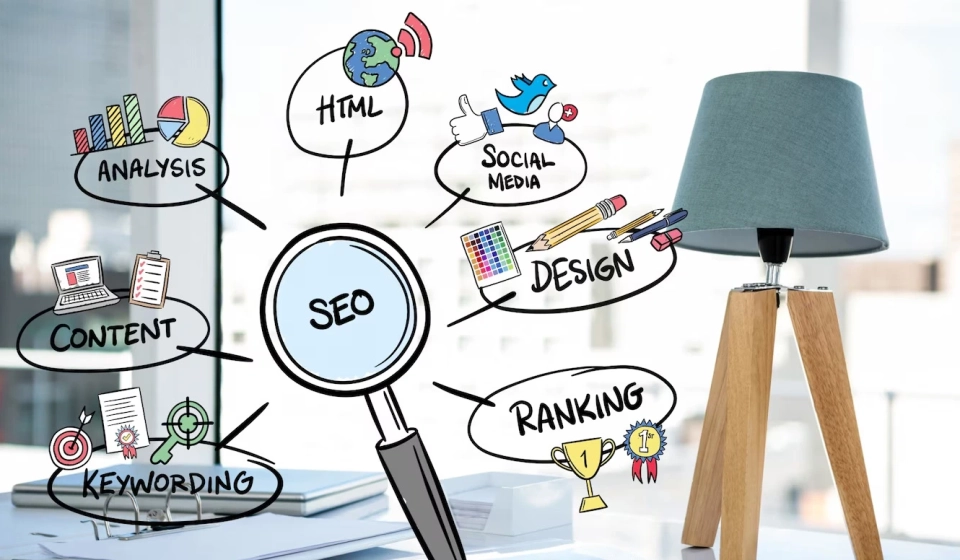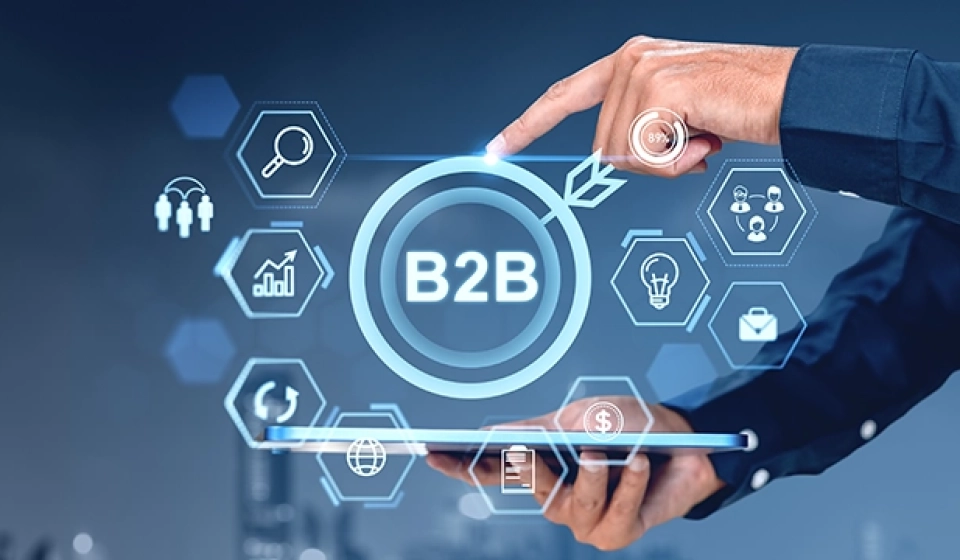The core of this guide is the in-depth examination of generative AI and its practical applications in B2B marketing. It explores how generative AI, a subset of artificial intelligence, can be harnessed to create value throughout the marketing funnel. Case studies and real-world examples showcase how generative AI can automate content creation, personalize messaging, and enhance customer segmentation, ultimately driving lead generation and conversion.
7 Most Crucial B2B Marketing Trends and Tips for 2024
In “Navigating the Future: 7 Most Crucial B2B Marketing Trends and Tips for 2024,” we delve into the rapidly evolving landscape of business-to-business (B2B) marketing, offering a comprehensive guide to help professionals stay ahead of the curve in the upcoming year. As the B2B marketing landscape continues to transform, it becomes imperative for businesses to adapt and adopt innovative strategies to remain competitive. This guide provides insights into the seven most crucial trends and actionable tips for success in 2024.
How to Utilize Existing SERP for B2B Marketing Blog Trends in 2024
Explore the dynamic world of B2B marketing in 2024 with our article, ‘How to Utilize Existing SERPs for B2B Marketing Blog Trends in 2024.’ In this comprehensive guide, we delve into the significance of Search Engine Results Pages (SERPs) and how they can be harnessed to bolster your B2B marketing efforts. Discover why SERPs matter and how they contribute to visibility, credibility, and competitor analysis.
Introduction to Sustainability and CSR in B2B Marketing
CSR is a business model that allows companies to hold themselves accountable to their stakeholders, the public, and themselves.
CSR is also known as corporate citizenship, companies can be mindful of their impact on society’s economic, social, and environmental aspects.
Many people consider sustainability to be a significant factor when making purchasing decisions.
As a result, companies often promote their corporate social responsibility (CSR) in their marketing efforts.
This approach has been successful in the B2C industry. It is now becoming more prevalent in the B2B sector as a means of building customer loyalty.
CSR aids in highlighting a company’s commitment to social and/or environmental causes.
Companies can demonstrate CSR in a variety of ways, depending on their industry and company. CSR activities benefit society and the environment instead of harming them.
Large corporations can implement CSR programs as they have expanded their business to the extent where they can contribute to society.
And setting standards of ethical behavior for their peers, competition, and the industry. Successful and prominent corporations carry greater responsibility towards the community and society.
The Basics of Corporate Social Responsibility (CSR) in B2B Marketing
B2B marketing focuses on the company’s purpose and involves promoting its values and mission alongside its products or services.
B2B businesses should align their marketing efforts with their purpose. This can foster a stronger connection with their target audience and create a more significant brand experience.
It’s essential to prioritize corporate social responsibility, and here are five reasons why:
- Build trust with your audience
- Attract and retain top talent
- Stand out from your competitors
- Stay ahead of government regulations
- It’s just the right thing to do
90% of the biggest companies in the world that have incorporated ESG programs into their business have made advancements.
This is because clients prefer to collaborate with corporations that are environmentally conscious, care for their workers, and support their communities.
Why Sustainability Matters in the B2B Sector
There are numerous opportunities for companies to engage in sustainable marketing practices.
Achieve this through the promotion of resource-saving products and services. Ecologically focused supply chains or donations to climate-neutral or social initiatives are essential in the B2B sector.
By adopting the motto – Do green things and promote it, businesses can enhance their B2B marketing efforts.
Effective arguments for communicating through sustainable marketing include the potential for lower costs and increased productivity.
Pointer:
- Reduce the use of energy and resources.
- Increase in effectiveness of technical systems.
- Decrease in the incentive or tax for CO2 certificates.
In general, it’s best to focus on improving costs, time, performance, and innovation. Industrial companies tend to prioritize improvement when they can see positive results.
Many consumers, particularly millennials, are increasingly cautious while spending their money. This generation is more invested in keeping the ecological balance than the previous generation.
However, when they do make purchases, there is a growing trend in favour of sustainable brands. These consumers prefer to support brands that promote pro-social values, use sustainable manufacturing methods, and adhere to ethical business practices.
You can reduce your business’ impact on the environment in many ways. For example, you can:
- Optimize your product life cycle
- Buy locally to save fuel costs
- Use products which is reusable
- Create an efficient (and fuel-efficient) distribution network
- Work with environmentally conscious suppliers and distributors
- Reduce packaging
- Source responsibly (e.g. using recycled materials and sustainable timber)
The Link Between Sustainability and Brand Reputation
All businesses are constantly in the public eye because of the rise in consumer awareness of environmental issues. Let’s dig deep into how sustainability and brand reputation have a connection.
Today more than 90% of CEOs recognize sustainability as crucial for their brand reputation. As a result, companies are giving importance to CSR programs for a better environment and well-being of the society.
The key realization for brands is that being eco-friendly encompasses social aspects, each crucial for a comprehensive sustainability strategy.
Consumers are turning towards sustainable brands to buy products and services. However, if you fail to communicate effectively with your consumers and showcase your brand’s initiatives, consumers may go with your competitors.
Therefore, paying attention to the messages you send out in press releases and on social media is crucial. The overall brand image you convey, to demonstrate to consumers what your brand represents.
Conclusion
CSR projects aim to make the world a better place and leave a clean and green environment behind. By directly benefiting the environment, the people, and the surroundings for a better future for the upcoming generation.
Moreover, the projects may have positive effects on a company’s internal operations. Employee satisfaction and staff retention will be enhanced knowing that their employer is giving back to Mother Nature.
People are choosing to work with companies that are attempting to be more conscious of the natural resources available.
The stakeholders and the consumers will come forward and support your cause. It will lead to an increase in the productivity and sales of the organization.
Achieving Better B2B Leads with Intent-Based Marketing
Identifying and getting suitable leads is crucial for success in B2B marketing. Intent-based marketing is one practical approach to achieve this. This strategy helps businesses understand the intent of potential customers. With this knowledge, they can customize their marketing efforts according to the preferences of the target market.
Intent-based marketing identifies the signals that show a potential customer’s interest or intention to purchase. Instead of casting a wide net, this approach allows businesses to focus on their efforts on those more likely to convert.
This blog discusses how intent-based marketing works and its benefits.
Understanding Intent-Based Marketing
Intent-based marketing relies on data analysis to interpret online behavior. By monitoring keywords, search terms, and content consumption patterns, businesses can gain insights into what potential customers are looking for.
For example, if a business sells office furniture and notices a company frequently searching for “ergonomic office chairs,” they can tailor their marketing efforts towards this product.
Benefits of Intent-Based Marketing
-
Precision Targeting
Intent-based marketing helps businesses to focus their resources on leads actively seeking their products or services. This precision targeting minimizes the wastage of time and effort on irrelevant prospects.
-
Higher Conversion Rates
Since intent-based marketing targets B2B leads that already exhibit interest, conversion rates are likely to be higher compared to generic approaches.
-
Personalized Approach
By understanding customer intent, businesses can create personalized content and offers that resonate with the potential customer needs. This enhances the customer experience and brings in trust.
-
Improved ROI
The targeted nature of intent-based marketing leads to a better return on investment (ROI) as marketing efforts are directed toward prospects with a higher likelihood of conversion.
Implementing Intent-Based Marketing
Businesses should have clarity on the steps for implementing intent-based marketing. This would help them generate quality B2B leads over time.
Let us look into the necessary steps involved in the intent-based marketing strategy.
-
Data Collection
Gather data from various sources, such as website analytics, search queries, and social media interactions. This data forms the foundation for identifying intent.
-
Keyword Analysis
Identify useful keywords and phrases that potential customers are using. This helps in crafting content that aligns with their interests.
-
Content Creation
Develop valuable content, such as videos, blog posts, and whitepapers, that addresses the needs and questions of your target audience.
-
Segmentation
Categorize leads based on their intent signals. For instance, you can differentiate and segment leads that are casually browsing, from those who are actively comparing products.
-
Tailored Outreach
Make targeted campaigns that speak directly to the intent of each segment. This could include personalized emails, retargeting ads, or relevant offers.
-
Continuous Monitoring
Businesses can Keep an eye on changing trends and behaviors to stay updated with their audience’s evolving needs. Regularly review and adjust the marketing strategies to match the current intent signals.
-
Feedback Loop
Brands must create a feedback loop by collecting insights from sales teams about the quality of leads generated through intent-based marketing. This helps refine the approach and make it even more effective over time.
Summing Up
Intent marketing offers a powerful strategy for B2B businesses to connect with potential leads that are more likely to convert. By analyzing intent signals and tailoring marketing efforts accordingly, companies can improve their conversion rates, enhance customer experiences, and optimize their marketing budgets.
In a competitive B2B landscape, intent-based marketing is an intelligent approach to maximize results.
Contact OnDot Media, a trusted B2B lead generation partner, if your company needs B2B lead generation assistance.
The Power of Employer Branding in B2B Marketing
In today’s world, where social media and online platforms are prevalent, clients and potential employees have access to a wealth of information about your company’s internal workings. For B2B tech companies, creating a positive employer brand is crucial for attracting new clients. Just showcasing casual office events is no longer adequate.
It’s not just about showcasing products and services; it’s about crafting a compelling narrative that attracts clients and talented individuals to join your team. This simple yet profound strategy can shape the very core of your business success.
Understanding Employer Branding in B2B Marketing
Think of your business as a place where people don’t just work; they thrive. Employer branding strategy establishes your company as an appealing and sought-after workplace.
It’s like painting a vivid picture of your organization’s culture, values, and opportunities. While B2B marketing typically focuses on attracting clients, employer branding extends that focus to attract top-notch talent.
Why Does Employer Branding Matter in B2B?
-
Attracting Talent
A strong employer brand is a magnetic force, pulling in skilled individuals who align with your company’s values. These individuals don’t just bring expertise; they get a shared commitment to your business’s success. Thus, employer branding is a feature that attracts excellent talents to the brand.
-
Cultivating Relationships
The B2B landscape thrives on partnerships and collaborations. When other businesses perceive your company as a great workplace, they’re more likely to see you as a trustworthy and reliable partner.
-
Enhancing Reputation
A positive employer brand elevates your overall reputation. As word spreads about the positive work environment and opportunities your company offers, your credibility and stature in the market increase.
Building an Effective Employer Brand in B2B Marketing
-
Define Your Identity
Begin by clearly defining your company’s values, mission, and culture. These pillars are the foundation of your employer brand. A company with no values and principles to showcase will starve to get talented employees and quality clients.
-
Showcase Employee Stories
Spotlight the stories of your employees. Let them share their experiences, challenges, and growth within the company. Authentic narratives resonate deeply with potential talent.
-
Create Engaging Content
Craft content that provides an inside look into your organization. Use videos, blogs, and social media to highlight company events, employee achievements, and day-to-day life at your workplace.
-
Leverage Social Media
Platforms like LinkedIn are gold mines for employer branding. Regularly post about company achievements, employee milestones, and workplace initiatives to attract talent’s attention. This will help build the brand’s reputation and eventually become known.
-
Engage with Potential Talent
Respond promptly to inquiries from potential candidates. How you engage with them gives them a glimpse into your company’s responsiveness and culture.
Benefits Beyond Talent Attraction
While attracting top talent is a pivotal outcome of employer branding, its impact extends beyond recruitment. It can even boost the overall operations and functions of the company.
-
Employee Retention
When your company’s values and culture align with employee expectations, job satisfaction increases, leading to higher retention rates.
-
Higher Productivity
A positive work environment breeds motivation and enthusiasm. Employees are more likely to invest their energy when they feel valued and engaged.
-
Client Trust
Businesses that see your employees as enthusiastic and committed are more likely to trust your offerings and collaborations.
Summing Up
Employer branding isn’t just a side note; it’s a key player in B2B marketing. By showcasing your company as a remarkable workplace, you’re attracting top talent, building stronger relationships, and enhancing your reputation.
Companies must remember that every connection matters in the business world, and a powerful employer brand can unlock doors to success you never imagined.
Contact Ondot Media, a B2B lead generation partner, if you want brand-building and lead generation assistance.
Reasons to Include Account-Based Marketing in B2B Marketing Strategy
In the ever-evolving landscape of B2B marketing, Account-Based Marketing (ABM) has been gaining remarkable traction. This personalized and targeted strategy is a game-changer for businesses looking forward to build stronger customer relationships and drive growth.
ABM is a one-to-one approach. Typically, enterprises with more than 1000 employees use this marketing approach. ABM helps the team in these enterprises to:
- Engage earlier in the process of sales and with higher value opportunities.
- Align strategic marketing initiatives with sales and account management strategies.
- Maximize marketing campaigns’ value and return on investment (ROI).
Implementing Account-Based Marketing in B2B Marketing Strategy benefits B2B companies. Let’s consider why including Account-Based Marketing in the B2B marketing strategy can be brilliant.
Precision Targeting
Unlike traditional mass marketing, ABM focuses on a select group of high-value accounts. By honing in on specific companies that align with your ideal customer profile, you can allocate resources more effectively and avoid wasting efforts on disinterested leads. This makes marketers save time and money from spending on futile efforts.
Personalized Approach
ABM personalization allows you to tailor your messaging and content to individual accounts. This personal touch creates a deeper connection and resonates better with decision-makers, increasing the likelihood of engagement and conversion.
Stronger Customer Relationships
When you invest time in understanding each account’s unique challenges and needs, you show genuine interest. This develops trust and lays the foundation for lasting partnerships beyond one-off transactions.
Aligning Sales and Marketing
Another Account Based Marketing benefit is that it promotes collaboration between sales and marketing teams. Both teams work together to create targeted campaigns that address specific account needs, resulting in a unified and consistent customer experience.
Increased ROI
With a focused approach, your marketing efforts yield higher returns. Since ABM targets high-potential accounts, the conversion rates are often higher, leading to better ROI on your marketing investments.
Efficient Resource Allocation
Instead of casting a wide net, Account Based Marketing benefits allow you to allocate resources strategically. You invest where it matters most, optimizing your time, budget, and energy for the accounts with the greatest potential.
Shorter Sales Cycles
Personalized messaging and focused campaigns help move leads through the sales funnel faster. The relevance of your offerings and the relationship you’ve built can expedite the decision-making process. This also makes marketers save time and focus on more prospects.
Enhanced Data Utilization
This is one of the most sorted Account Based Marketing benefits. ABM relies on deep insights into your target accounts. This data-driven approach makes you have informed decisions, refine strategies, and continuously improve your campaigns.
Tailored Content Creation
Creating content that addresses particular pain points and interests of target accounts enhances engagement. Personalized content resonates more effectively, whether it’s articles, webinars, or case studies.
ABM requires tailored content as it is personalized content. It makes the prospects feel more trust in the brands.
Market Expansion
ABM is for more than just your existing customer base. It can also help you tap into new markets and industries by identifying and targeting potential clients who fit your ideal customer profile.
Summing Up
Account-Based Marketing offers a powerful approach to B2B marketing that centers on personalization, precision, and building solid relationships. By focusing on a particular group of high-value accounts and tailoring your strategies accordingly, you can drive growth, maximize ROI, and foster enduring customer connections.
In today’s competitive B2B landscape, embracing ABM best practices could be the key to unlocking your business’s potential.
Contact OnDot Media, a trusted B2B Account Based Marketing partner, if your company needs ABM assistance.
How Can B2B Video Marketing Benefit Companies
Video marketing for B2B companies generates leads uniquely. Video marketing is a fantastic way for businesses to reach out to other companies and make their products or services look fantastic.
Due to this fact, B2B companies do bother with video marketing. Businesses know in the age of YouTube and TikTok, videos are the perfect thing to get into prospects’ minds with strong elements of brand messaging. Videos catch the attention, tell a story, and make people want to know more. And that’s precisely what they do for businesses. Thus, the importance of video marketing is paramount in B2B digital marketing process.
When a company makes a video about its products or services, it can showcase everything they have to offer engagingly. They can explain how their products work, show them in action and even tell stories about how they helped other businesses. Prospects will be able to watch it as a movie. This is one of the main benefits of B2B Video Marketing for businesses.
Benefits of video marketing for B2B companies.
Grabs Attention
Imagine someone is scrolling through the feed, and suddenly, they see an eye-catching video. They can’t help but click on it. That’s precisely what B2B video marketing does for companies. It grabs the attention of other businesses, making them curious about what the company has to offer.
Builds Trust
Watching a video can be like meeting someone face-to-face. It creates a connection and builds trust. Companies can use videos to introduce their team members, share success stories, or even provide testimonials from happy customers. This builds confidence in their brand and shows they are legit and reliable.
Explains Complex matters
Sometimes, businesses have excellent technical products that could be clearer to explain in words. But with video, they can break down those complex ideas into easy-to-understand visuals. This video marketing strategy will work magically for businesses.
Boosts SEO
B2B videos can help companies show up higher in search results. When businesses share videos on their website or social media, it increases the time people spend on their site, which search engines love. So, companies get hype and rank higher on Google.
Viral on Social Media
Businesses know how videos go viral on social media. Most companies want that. When a B2B video engages, other businesses and people share it with their friends, and it becomes viral. This means more exposure and potential customers.
Saves Time
Business professionals are busy. So, when they want to learn about a product or service, they need more time to read long boring articles. They can watch a short, sweet video covering everything they need to know. It’s quick and easy.
Influences Decision-making
When a company sees another company doing amazing things in a video, it inspires them to make the right decision. They may think that if it worked for them, it would work for us too. It’s like having a positive influence on others.
Measures Success
B2B video marketing is about more than just making excellent videos. Companies can track how many people watch their videos, where they stop watching, and if they take any action after watching. This helps businesses know what’s working and what needs improvement.
Summing Up
B2B video marketing is a weapon for companies to generate leads, build trust, and show off their unique products and services. It’s a win-win for them. Thus businesses can try more video marketing for B2B as part of their digital marketing plan.
Contact Ondot Media, a B2B lead generation partner, if your company needs assistance.
How Can Mobile Apps Help in B2B Lead Generation
Today, running a business without a mobile app and mobile marketing is impossible. Mobile apps have become an indispensable part of the everyday lives of people. Thus it is a proactive way to do B2B lead generation. Going with the trend is the most valuable thing in business marketing.
Let us explore the fascinating world of mobile apps and how they revolutionize B2B mobile app lead generation. These small but mighty apps are changing how businesses find potential customers and grow their ventures.
B2B Lead Generation
Before delving into the wonders of mobile apps, let’s understand what B2B lead generation is all about. B2B is business-to-business, where one business sells products or services to another. Lead generation involves finding potential customers or leads who might be interested in what your business offers.
Let us look into how mobile apps help generate business leads.
Accessibility
One of the most crucial advantages of mobile apps for B2B lead generation is their accessibility. In a world where smartphones are always at our fingertips, having a mobile app makes it incredibly easy for business professionals to connect with the company, explore the products, and potentially become a lead.
Personalized Experiences for Maximum Engagement
Imagine customers downloading a B2B app that greets them with questions about their business needs. Suddenly, they have a personalized feed filled with relevant content and offers tailored just for them. Mobile apps have the power to create personalized experiences, making it feel like you have your very own personal shopper for B2B products.
Harnessing the Power of Push Notifications
Push notifications are proactive ways of getting attention! These pop-up messages can be sent directly to user’s phones, even without using the app. Businesses can use push notifications to announce new products, share special offers, and keep users engaged, all while doling mobile app lead generation.
App Development Made Easy
Building a mobile app for business is more accessible than people might think. Many companies offer app development services; some even provide customizable templates matching the brand.
Data Collection
Mobile apps can gather valuable user behavior data, giving businesses insights into what content and features attract potential customers. This data treasure trove helps optimize the app for more effective mobile marketing.
Tips for Successful Mobile App Lead Generation
We have explored the power of mobile apps in B2B lead generation. Now let us look into some quick tips to make the most out of mobile marketing:
- Simplicity is Key: Keep the app user-friendly and easy to navigate.
- Value-Driven Content: Provide helpful tips, industry insights, or exclusive offers to keep users engaged.
- Brand Identity Matters: Ensure the app represents the business with a recognizable logo and colors.
- Engage with Users: Respond to comments, questions, and feedback to show you care about their needs.
- Stay Fresh and Relevant: Regularly update the app with new content and features to keep users returning for more.
Summing Up
Mobile apps are not just for fun and games; they are potent tools for B2B lead generation. With their accessibility, personalized experiences, and data-driven insights, mobile apps can propel business to new heights. So companies that do not have a mobile app can conquer the business world with an excellent app.
Contact OnDot Media, a trusted B2B lead generation partner, if your company needs B2B lead generation assistance.
The Future of Content Syndication Strategies for Businesses
Content syndication is like publishing your content across different platforms. It’s like sharing your blog posts, videos, or articles with a broader audience, ensuring your brand gets the spotlight it deserves.
This blog discusses the future of content syndication strategies for businesses. People’s attention spans are getting shorter by the day. So, companies need to find creative ways to reach their audience wherever they are online.
The future of content syndication is going to be beneficial for all businesses. Businesses can have proactive content syndication strategies to keep their content in the spotlight.
Futuristic approaches of Content Syndication
Personalized Content
Everyone knows that Netflix suggests shows and movies based on what people have watched before. Businesses can go with personalized content syndication as it works well. Businesses will use AI to analyze user behavior and interests to deliver tailor-made content. So, the audience will get content that’s made just for them.
Interactive Content
Content can be boring for the audience at times. And nobody has time to go through those boring content. In the future, businesses will see more interactive content like quizzes, polls, AR/VR experiences, and other game-related content. It’s all about engaging the audience and making them part of the storytelling process. So it will get rid of more passive scrolling.
Micro-Influencers Will Rule
Mega and micro-influencers will take the spotlight in the future. They are the influencers with a good number of active followers. Businesses will collaborate with them to reach niche audiences and create authentic connections.
Multi-Platform Syndication
Many platforms fight for the attention of their audience. They include TikTok, Instagram, YouTube, etc. Businesses must adapt their content style to fit each platform’s vibe. One-size-fits-all will not work anymore. Flexibility is the key.
Augmented Reality (AR) Content
AR will transform content syndication, bringing products and experiences into the homes. Imagine doing makeup virtually or seeing how that fancy couch looks in your living room. The audience will have a mind-blowing experience. Businesses must adapt it to provide an excellent customer experience and engagement.
Podcasts will Become Crucial
Podcasts are already there. But they will become even more crucial for businesses in the future. People love listening while they’re on the go, and companies will use this audio form of content to share valuable content with their audiences. This will have a significant effect on business content sharing in the future.
Eco-Friendly Content
Everyone cares about the planet. Businesses will adopt eco-friendly content strategies, focusing on sustainability and social responsibility. People will support those who care about mother earth.
User-Generated Content (UGC)
People love sharing their opinions and experiences online, and businesses know it. Thus, companies will encourage more UGC because it’s authentic and relatable and builds a strong community around their brand. It can make the posts go viral. So, businesses will focus more on it in their content syndication strategy in the future.
The future of business content syndication strategies will be more beneficial and impressive for companies. With personalized, interactive, and sustainable approaches, brands will level up their content practices and create stronger connections with the audience.
Content syndication is an excellent strategy for businesses to generate leads and eventually close many sales. Being everywhere online with engaging content is very important for business today. So, adopting these future trends of content syndication strategy is essential for businesses of all domains.
Contact OnDot Media, a trusted B2B content syndication partner, if your company needs B2B content syndication assistance.

